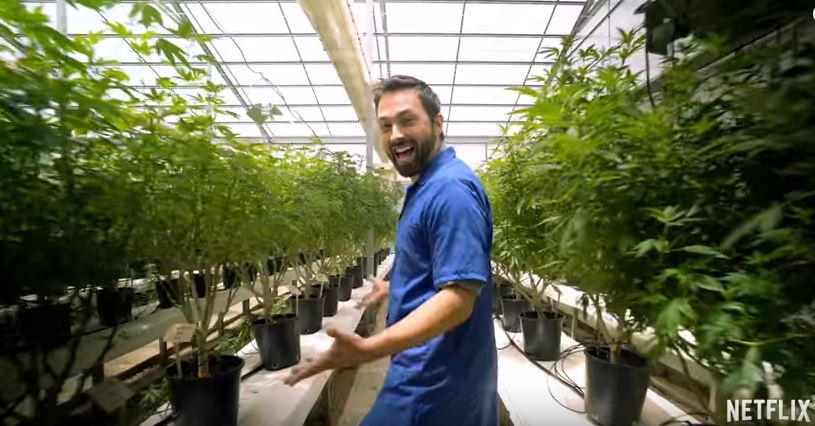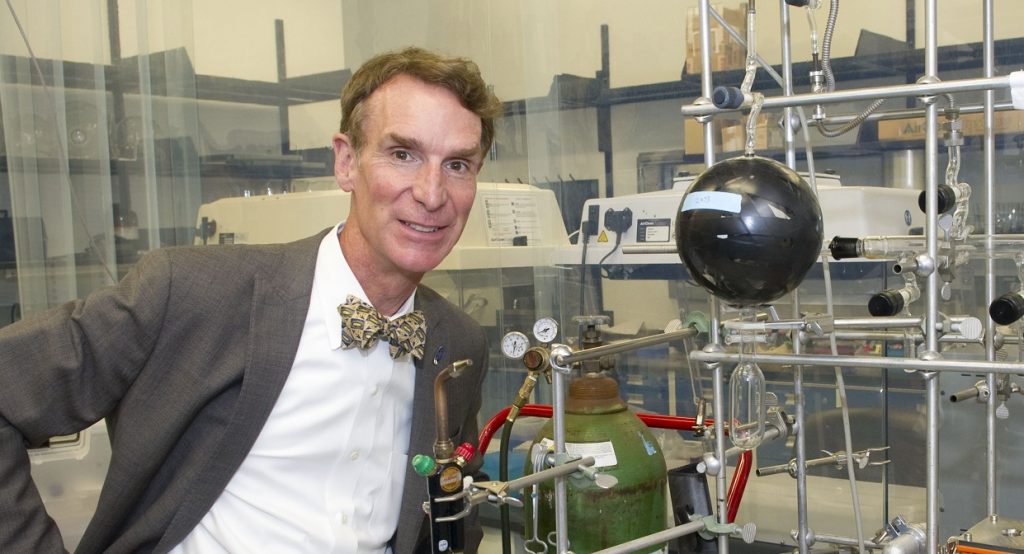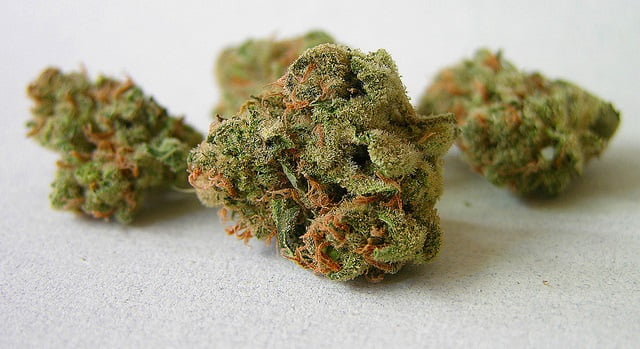Bill Nye, the American science educator known to almost every North American 90s kid from the show “Bill Nye the Science Guy” which ran from 1993 to 1998, has a new series and it features an ode to Israel’s groundbreaking medical marijuana research.
The TV personality and scientist, who now hosts the Emmy-nominated Netflix series “Bill Nye Saves The World”, devoted the show’s second season debut to an in-depth look at cannabis, with a nod to Israel as the world leader in the field of research.
SEE ALSO: Israel Sees Booming Demand From Farmers To Grow Cannabis
In “The Marijuana Episode,” the former children’s television star goes as far as getting an online license to buy medical marijuana in California and then proceeds to buy some at medical cannabis dispensary because it’s “for science.” Besides talking cannabis regulations with film director Kevin Smith and others, he also offers a playful take on the history of weed.
In the show’s segment called “How is Israel healing the world with marijuana,” correspondent Derek Muller is sent to Israel to report on cannabis research on the Jewish state. Muller, who is known for his popular YouTube channel Veritasium, spends much of his time in Israel in a pharmacological laboratory for Tikun Olam, the largest supplier of medical cannabis in Israel, and one of the top medical cannabis companies in the world. The company borrowed its name from the concept in Judaism of “Tikun Olam,” or “repair the world,” which refers to the pursuit of social action and social justice.
Tikun Olam operates the largest cannabis farm in Israel and is licensed by the Israeli government. Since 2010, Tikun Olam products have been used in ongoing clinical trials in the country’s regulated medical cannabis market.
In the episode, Tikun Olam CEO Aharon Lutzky explains to Muller that the company’s success stems from the Israeli government’s cooperation with private industry. NoCamels reported that Tikun Olam, which has one of the largest cannabis treatment databases in the world and developed a variety of marijuana strains, has cooperated with companies in Canada, the US, Australia and Spain. US operations for Tikun Olam were established in 2015 as T.O. global in a joint venture with Tikun Olam in Israel and there are similar partnerships in Canada, Australia, the UK, and South Africa.
The episode also highlights how far the United States, a country that is 473 times Israel’s size, is lagging behind. According to Nye, the Drug Enforcement Agency (DEA) does not even recognize cannabis as having medical value, therefore making it difficult to grow the marijuana plant in the United States for medical research.

Bill Nye’s correspondent Derek Muller visits the Tikun Olam pharmacological lab in Israel. Screenshot from Netflix
“Nobody’s really sure how it works — marijuana,” Nye tells CNet’s Bridget Carey in a sit-down interview in December, “Nobody’s exactly sure what it does. And so, there’s a very strong argument that keeping it as a Schedule 1 drug is not based on any science,” Nye says, defining a Schedule 1 drug as any drug presumed to be addicting and have no medical value, “But people use marijuana and marijuana extracts for all sorts of medical applications,” he explains.
“It is literally easier to study meth,” he said.
Sign up for our free weekly newsletter
SubscribeIsrael as a medical cannabis hub
As the United States struggles to find its footing in the world of weed, Israel is easing its restrictions on medical marijuana in a number of ways.
Last year, the Israeli Ministry of Agriculture officially classified the growing of medical cannabis as a “farming sector,” paving the way for marijuana growers to receive government aid, grants, training and water quotas, NoCamels reported in December. The government also announced it would invest $2.13 million in 13 research projects on cannabis, making Israel one of three countries with a government-sponsored cannabis program. By December 2017, nearly 400 farmers had applied for permits to grow cannabis following the government’s decision to ease marijuana policies.
At the time, Yuval Landsheft, the head of the Health Ministry’s Medical Cannabis Unit, told Knesset lawmakers that by January 2018, 22 pharmacies would receive permits to sell medical cannabis products with GMP (good manufacturing practice) certification to serve local patients. Also, the number of doctors allowed to issue medical cannabis prescriptions would expand and the licensing process for those with permits to use medical marijuana would be overhauled, Landsheft said.
Israel has long been considered a pioneer in marijuana research thanks to Hebrew University of Jerusalem Professor Raphael Mecholuam’s medical cannabis research in the 1960s. Mecholuam, an organic chemist, was the first to isolate and identify marijuana’s THC compound, the chemical known for causing a “high.” In 1996, Israel became the first country in the world to develop a national program focusing on medical marijuana.
Israel’s stance on marijuana is in stark contrast to the US government’s more rigid regulations as of late. In early January, US Attorney General Jeff Sessions rescinded a trio of memos from the Obama administration that had adopted a policy of non-interference with marijuana-friendly state laws.” Marijuana is still illegal under US federal law and Sessions’ policy allows federal prosecutors to decide which marijuana cases to prosecute, creating a state of discord between federal and state law.
Repair the world
Israel has been positioning itself to be a top medical cannabis exporter expected to have $1 billion worth of annual sales, and foreign investors have noticed, pouring $100 million into Israeli cannabis startups in 2016 alone, according to Saul Kaye, founder and CEO of cannabis tech startup accelerator iCAN.
In March, global cannabis leaders will flock to Tel Aviv for the annual Cannatech conference, a one-of-a-kind cannabis innovation summit from March 19-20.
SEE ALSO: Aiming High: Israel Expects To Export $1 Billion Worth Or Medical Cannabis Annually
Related posts

Editors’ & Readers’ Choice: 10 Favorite NoCamels Articles

Forward Facing: What Does The Future Hold For Israeli High-Tech?

Impact Innovation: Israeli Startups That Could Shape Our Future






Facebook comments